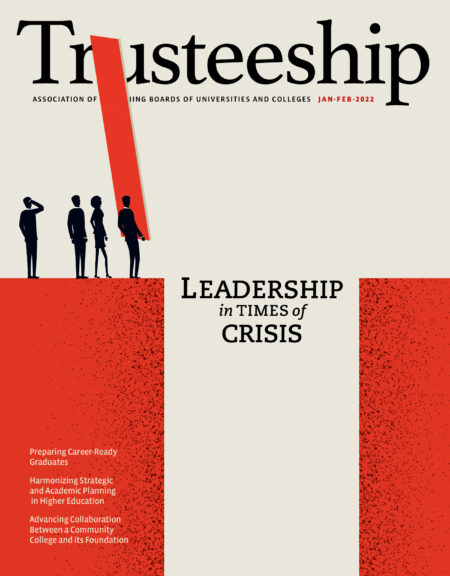
In light of our emphasis on student success—AGB is sharpening our focus to educate, inform, and inspire boards and their members, in collaboration with their chief executives and leadership teams, to oversee this critical outcome of higher education. This important work will focus on all sectors of higher education with the following partners:
- AGB and the Gardner Institute for Excellence in Undergraduate Education are developing a student success academy for all higher education institutions in a single state. This project, funded by a three-year grant from Ascendium, focuses on elevating the achievements of underrepresented students and students from low-income and rural backgrounds in Kentucky. We will share initial observations during the AGB National Conference on Trusteeship (AGB.org/NCT) in April 2022.
- The Bill & Melinda Gates Foundation has awarded AGB an initial grant to create a multimedia curriculum to empower boards and key administrators to collaboratively influence student success—for all students. This important work will conclude at the end of 2022, and we will leverage key findings and programming assets from the Ascendium project in Kentucky.
- AT&T is supporting AGB to form and launch our first-ever, cross-functional Council for Student Success. Members of this Council include board and committee chairs, chief executives, other experts in higher education, and select cabinet members and faculty. The insights from this new council will be transformed into actionable intelligence and practical resources to support institutional efforts focused on increasing retention and graduation rates, preparing and providing support for students to secure meaningful employment and/or for professional and graduate school, reducing debt, and creating long-term value for society.
Throughout the year, we hope to announce other opportunities to reimagine how higher education boards can oversee student success and what can be done to bolster current efforts.
As part of this effort, we suggest that boards ask the following questions:
- How does your board define student success, and are the components of this definition aligned with your chief executive’s priorities?
- From a board oversight perspective, how does your board ensure that your institution is prioritizing and allocating sufficient and effective resources, particularly advising, mentoring, academic support, counseling, and career services to advance student success—for all students—and how does your board measure results versus anticipated outcomes?
- Are increasing percentages of your students engaged in meaningful on- and off-campus experiential learning opportunities such as internships and extended projects that can be translated into employer-valued competencies or help prepare students for graduate education?
- Is your institution providing sufficient financial aid that enables your students to graduate without them—or their families—incurring crippling debt? If not, what do you need to do to achieve these goals?
- Is your institution effectively addressing the growing concerns about student wellness? Unfortunately, many students are experiencing anxiety and even serious depression, particularly for students who were “locked down” during the last year and one-half due to COVID-19.
- What more can you as a board member or your board as a whole do to facilitate success for all students? Do board agendas routinely include opportunities for trustees to understand the threats to students’ success? What institutional policies and priorities could favorably influence graduation rates and enable post-graduate success and does your institution have a strategy to achieve these goals?
Board members are often able to provide strategic insights about how to best foster student success based either upon their own experiences as students or sometimes that of their employees. According to the AGB survey report Policies, Practices, and Composition of Governing Boards of Colleges, Universities, and Institutionally Related Foundations 2021 (AGB.org/PPC), an overwhelming majority of foundation (97.6 percent) and independent institution (95.1 percent) boards, as well as a smaller majority of public boards (50 percent), are seeking to diversify their board composition based on dimensions such as age, gender, race/ethnicity, professional backgrounds, and life experiences. These commitments will help boards to understand and address the needs of increasingly diverse student bodies.
AGB stands ready to help board members ask thoughtful questions and deeply engage in strategic dialogue with their board colleagues and chief executives to position their students and their institutions to thrive in the future.
Henry Stoever, AGB President and Chief Executive Officer




